Chapter Five: The Very Long Road To Ireland Part One - Via ScotlandAngered and frustrated by the Sudreyans, Ivar ended the wars by mopping up the remaining Earls, but Oriel and Dublin were now firmly beyond his grasp. Although Ivar certainly had the power to subjugate Sudreyar by force now, he had other plans in mind. He summoned his vassals to him in Ath Cliath and made it known that he intended to invade Scotland within the next two years, seizing the crown from the fat Queen Morag as an inheritance for his youngest son. In preparation for the invasion, he began sacking her capital with raiders.
As a Norse pagan, you can announce your intention to invade non-pagan countries of between 9 to 40 counties in size. You can only do this once in a lifetime, but after the announcement you get two years to prepare your invasion, during which adventurers and housecarls turn up at your capital in preparation for the war to come. These troops require no upkeep and are in it purely for the gold and glory, but if you don't declare war during the two years they'll turn on your and seize your holdings instead.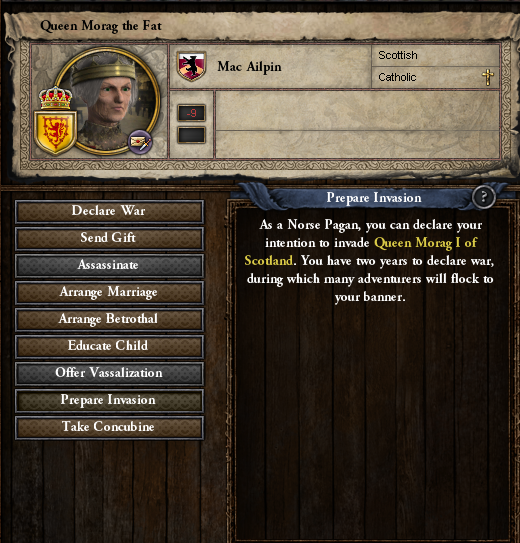
In September 891 Prince Aed came of age, and he proved something of a disappointment. Though certainly learned in the sagas, Aed possessed none of the interest his father had for learning and merely trotted the old tales out by rote. Overall he was a terribly mediocre man. King Aed tried to remedy this somewhat by marrying him to a promising young bride, but he held few hopes that his son could carry on his legacy successfully.
Aed's other legacy proved more hopeful. After his long years of reign and the impressive acts of his kingship, the Norsemen in Dublin had finally begun to adopt his habits and practices. Irish culture now extended over the whole of Ireland once more. His years of raiding in particular had struck a chord with the populace, who now regarded him as a great viking, to be feared by foreigners everywhere.
Unfortunately, it was about this point that the years of stress finally got to King Aed and he started to go completely and utterly mad.
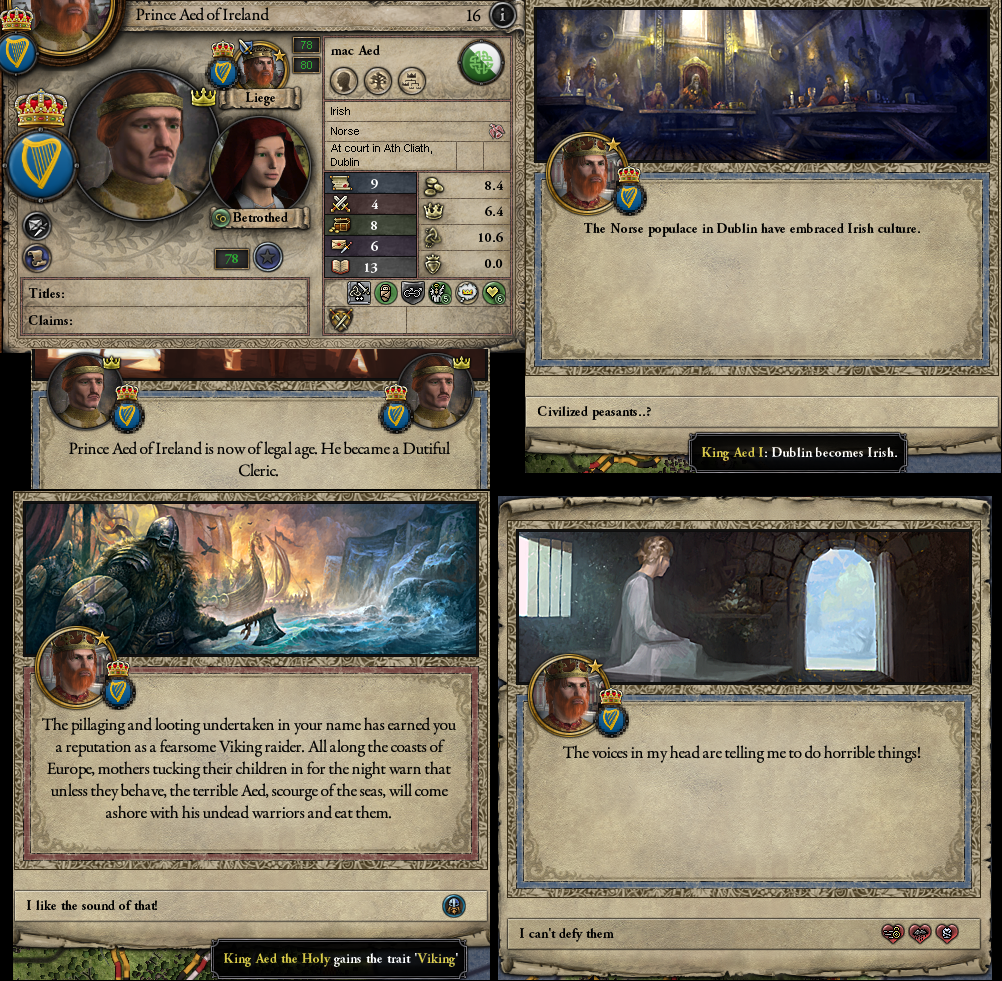 I neglected to capture the tooltip, but this event gets rid of stress and/or depression and replaces it with batshit insanity instead. Aed has gone completely off the deep end.
I neglected to capture the tooltip, but this event gets rid of stress and/or depression and replaces it with batshit insanity instead. Aed has gone completely off the deep end.In March 893 Aed felt he had attracted all the support he would, so he launched his ships from Dublin and made war on Queen Morag the Fat. With her levies already wrecked from months of raiding, Morag was unable to mount sufficient defences to overcome the parties landing at every coast of Scotland. Within a month, invaders were besieging every fort in Scotland save the mountains of Atholl, and the Scottish army was reduced to eight hundred men fled to Sudreyan Lothian.
Aed celebrated by turning into a wolf for a night and howling at the moon. At least, as far as he was concerned.
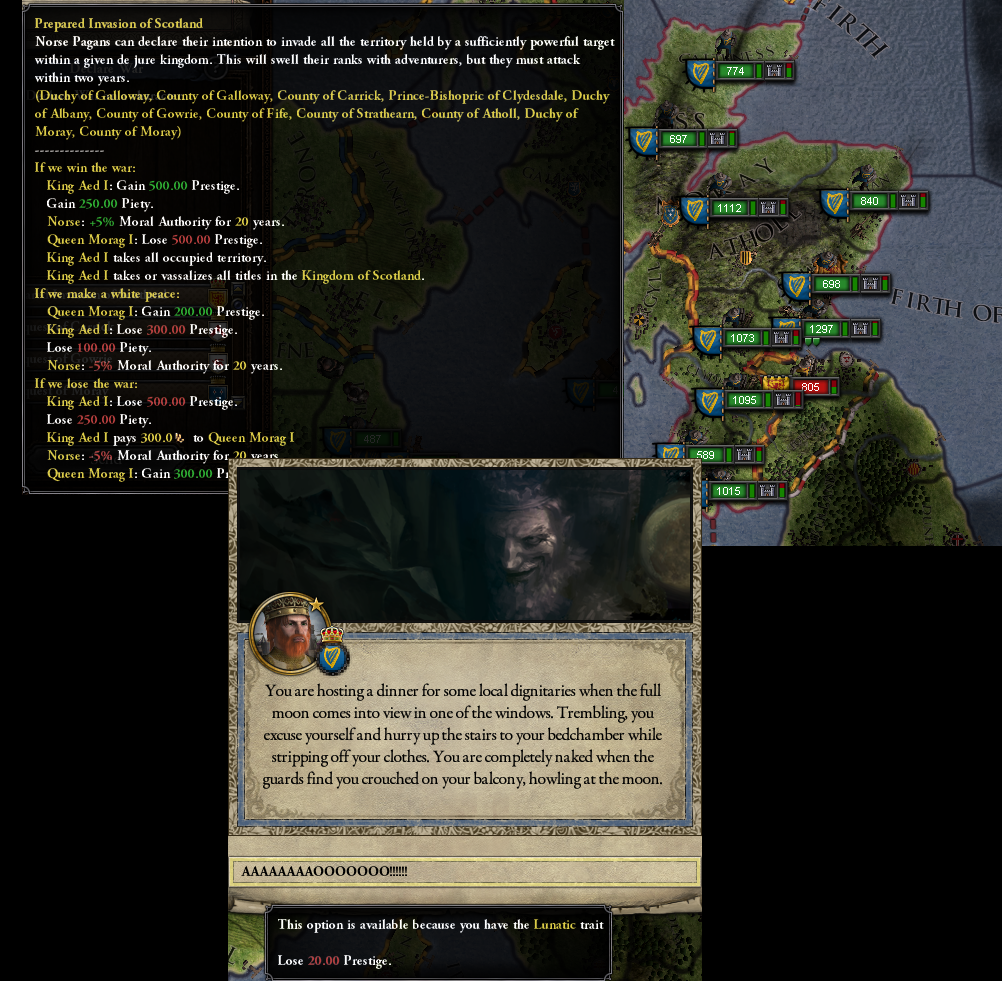 Completely and utterly off the deep end.
Completely and utterly off the deep end.The occupation of Scotland was actually a fairly straight-forward affair. Despite one attempted incursion by the King of Deheubarth (an old foe by now), Aed's out-numbering and out-manoeuvering of Morag had already won the war before it began. Morag surrendered in September 894 and Aed took possession of the whole of Scotland as a result.
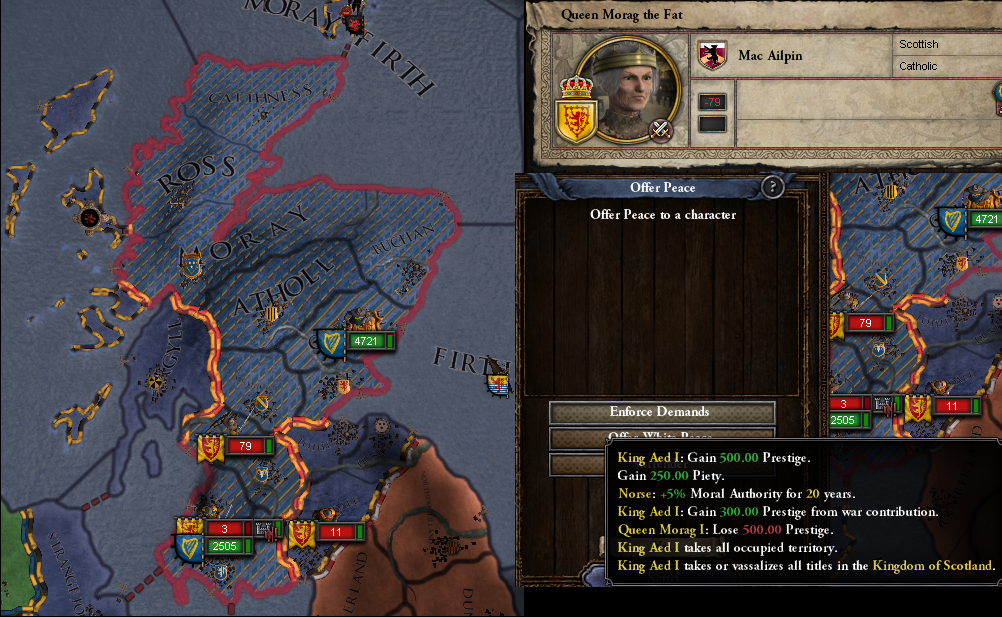 You notice how Scotland isn't fully covered in those bars? It isn't necessary to capture every holding in an invasion to get every holding. If you take the county-level holding (usually a fort), the minor baronies come with it automatically when the conquest is complete.
You notice how Scotland isn't fully covered in those bars? It isn't necessary to capture every holding in an invasion to get every holding. If you take the county-level holding (usually a fort), the minor baronies come with it automatically when the conquest is complete.Aed's first act as Conquerer of Scotland was to officially crown himself as King. He immediately carved up the kingdom amongst Irish-Norse vassals of decidedly mediocre promise; when his sons inherited, the inheritance would split cleanly between kingdoms and his favoured elder son would have the advantage of a united, large personal demesne versus the weak territory of his brother. There would be a war of succession, but it would be a war Aed could stack the odds for well in advance.
 Note the direct vassals map: Scotland is neatly carved up into independent counties, all acting as rivals to one another. Consolidating vassal levies is a pain, sure, but it limits the power of super-dukes, which is important in the future civil war.
Note the direct vassals map: Scotland is neatly carved up into independent counties, all acting as rivals to one another. Consolidating vassal levies is a pain, sure, but it limits the power of super-dukes, which is important in the future civil war.With Scotland officially part of his demesne, Aed now had a legitimate reason beyond mere subjugation to war on Ivar's son Sigtrygg, Duke of Sudreyar and former prisoner of Aed's. Aed sent Sigtrygg a messenger to announce his coronation and to present a fruit basket with a declaration of war. Thus followed the usual mad scramble between neighbours to gather their troops together in time. The only conflict of note was early during the war at Dunbarton, where King Aed lured the majority of the Sudreyan troops into a trap with some off-shore longboats, pincering them. The war was soon resolved after that.
 Note that only Inse Gall has been taken, not the whole duchy. Good things come to those who wait.Chapter Six: The Very Long Road To Ireland Part Two - Via England
Note that only Inse Gall has been taken, not the whole duchy. Good things come to those who wait.Chapter Six: The Very Long Road To Ireland Part Two - Via EnglandThe next stage of Aed's plan required some time to pass, so he passed it as any good Viking would; through war. The largest threat to Aed's supremacy over Britain was the neighbouring kingdom of Jorvik, now ruled by a son of Halfdan Whiteshirt; King Gudfrid. Aed declared his intent to subjugate the north of Aengland entirely and made war upon Gudfrid, demanding his fealty.
Once again, Aed deployed his armies in a screen across the whole of Jorvik. The attack prompted a rebellion from the Chief of Jorvik proper (while Aed's army was camped on his doorstep) and an attempt by King Gudfrid to revoke Worcester from his vassal caused another revolt as well.
Like an Invasion, Pagans can only declare a war of subjugation once in their lifetime; so they should make them count! Jorvik is the largest landholder I can reasonably take in a fight, so they're the target of choice. Hence why I didn't just subjugate the Islands instead.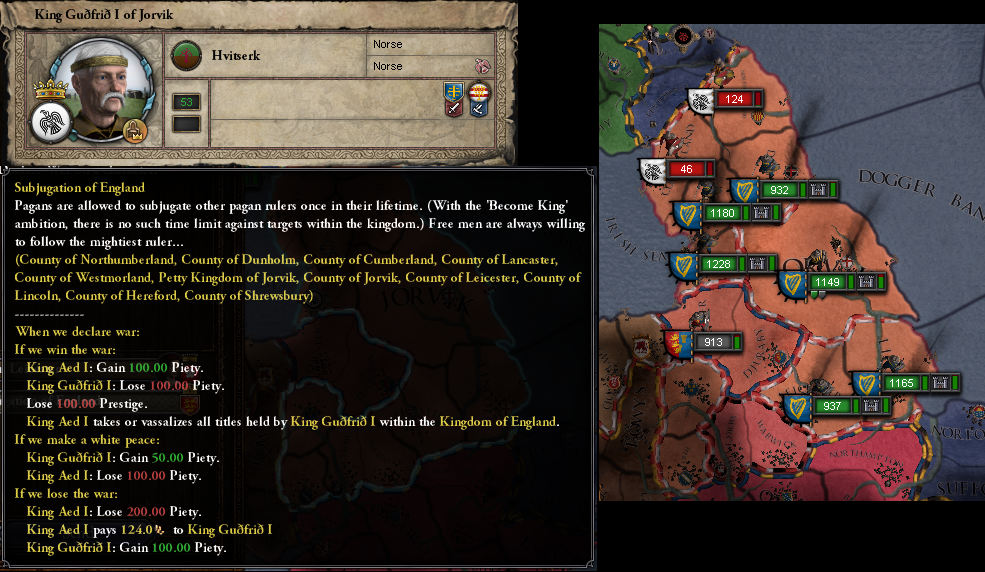
Mid-way through the war, King Sigtrygg met his end in an unfortunate carriage accident. Sigtrygg, to his credit, has survived several other accidents beforehand, most of which were not even framed as accidents. He had successfully evaded a barrage of arrows, highwaymen, poison, snakes and even the classic exploding manure trap before finally succumbing to gravity. King Aed held a four day celebration upon his death and sent his heir a fruit basket in celebr- comissaration.
In light of the burdensome taxes levied to pay for said celebration, a deputation of burghers greeted King Aed and humbly requested a reduction in taxation. Aed proceeded to explain to them how essential their contributions were, and how they personally were helping to make Ireland great. The deputation left, flattered but still poor.
If your city taxes are set any higher than 'minimal', the burghers will occasionally demand you lower them. You can refuse them outright, which is wildly unpopular, but if you have good stewardship you can bribe them (with an absurd amount of money) and if you have good diplomacy you can fob them off with excuses. Having at least 10 diplomacy is a must for rulers, and since my taxes at set to the maximum it's pretty essential.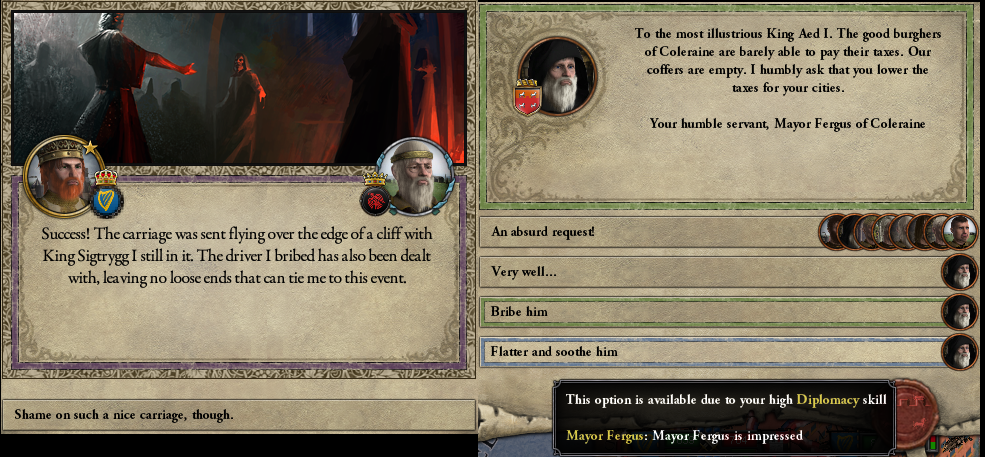
The war for Jorvik was resolved quickly enough, but with problems. The new Jarl Gudfrid though now subjugate to Aed was still a powerful vassal within the realm, far more powerful than might otherwise be desired. Furthermore it left a great deal of culturally Norse vassals in England proper. Aed's first step to fixing this was a campaign of careful re-education. Several of his vassals were still children, and nearly all had children, so Aed mandated that all heirs would be taken to Ath Cliath to receive education as befit their status - and in the process turn them into good little Irishmen.
To help expedite this process, Aed mandated the construction of the first ever University in Ireland to begin in Dublin. While the aim of re-educating the heirs was mostly for hostage reasons, Aed was genuinely interested in improving the lot of Dubliners and in learning as a whole. He gathered together skalds and wise men from across the breadth of his demesne and found housing and comforts for them in Dublin in exchange for their wisdom and instruction.
Universities are both some of the most useful and most expensive buildings, but only in the long run. With The Old Gods' changes to the technology system, universities now not only help with the spread of knowledge but actively contribute to your research of economic technology in the capital, technology that will ultimately spread to enhance the whole of your demesne. I'll explain technology as it is now at a later date, when we are finally ready for peacetime.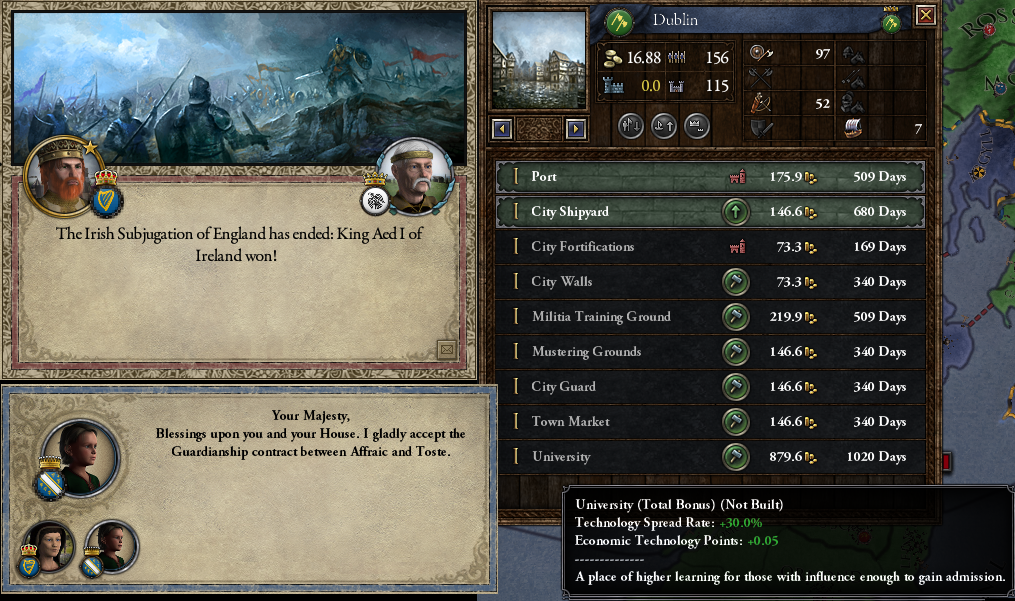 Pictured: Irish-Norse values. Dublin may be literally nothing more than cluster of huts around a shipyard and port for the king's navies, but by Odin it'd better be able to support a nest of learning to rival the Jami'at al-Qarawiyin.
Pictured: Irish-Norse values. Dublin may be literally nothing more than cluster of huts around a shipyard and port for the king's navies, but by Odin it'd better be able to support a nest of learning to rival the Jami'at al-Qarawiyin.
I would compare it to the universities of Oxford and Paris, except they don't exist yet! In another victory for ahistoricity (because unifying Ireland in the ninth century wasn't enough), Dublin boasts the first university in the non-Islamic European world. Since this university isn't based out of the Christian monastic scholarly tradition, one assumes that it literally consists of godis and skalds passing on their wisdom and debating through a mixture of oral tradition, runic works and constant insult rap-battles.Not that Aed was ready for peace. The Queen of Sudreyar, Sigtrygg's heir, was presently facing a revolt from the Chief of Suffolk (backed up in force by Denmark). Aed was unwilling to allow such a dangerous force within his kingdom, so he made plans accordingly and declared his own war on the Queen.
Although not opposed to the Danish troops doing the lion's share of the work, the mutually conflicting war allowed Aed's armies to assault those Sudreyan positions held by the Chief of Suffolk, such as Norfolk. The goal was to reduce the amount of clout Suffolk had over the Queen and prevent an early and undesirable peace.
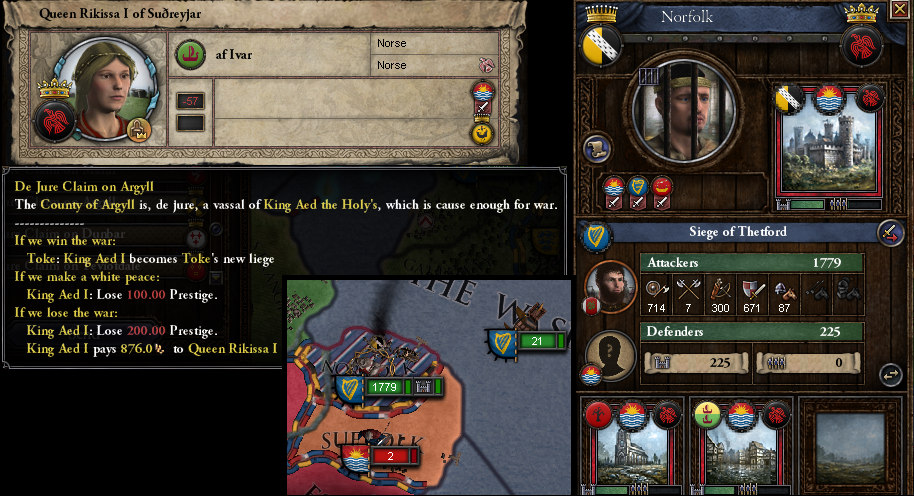
Unfortunately the effort was unsuccessful and Chief Bertil of Suffolk became King of Sudreyar. His reign would naturally be long-lasting and fruitful, which is why Aed sent him a commemorative fruit basket on his coronation. That it contained a declaration of war was merely coincidental.
This time the King of Sudreyar had ample time to gather his forces before battle was finally joined. Unfortunately for him, so did King Aed. The first battle of the war, at Elgin, saw Bertil's forces crushed five-to-one, a feature that was to repeat several times during the war.
It was during this war of the year 900 that the mac Aed clan saw a birth and death, with the youngest member and grandson of King Aed, Gilla-Comain, coming into the world a healthy young child. Within the year it became apparent he was a very quick young child, taking far more after his mother than his father. It was around this time that his elder brother of four years, Aed mac Aed (mac Aed) passed away in his sleep from unknown causes. Foul play was suspected, but the Godis suggested that Odin had other plans for the young child.
Aed, son of none, has the kinslayer trait for a reason. There can be only one heir, and he must be the strongest there is. Aed mac Aed had better pray neither his younger brother nor second son outshine him before Aed dies, or he might find himself short a succession.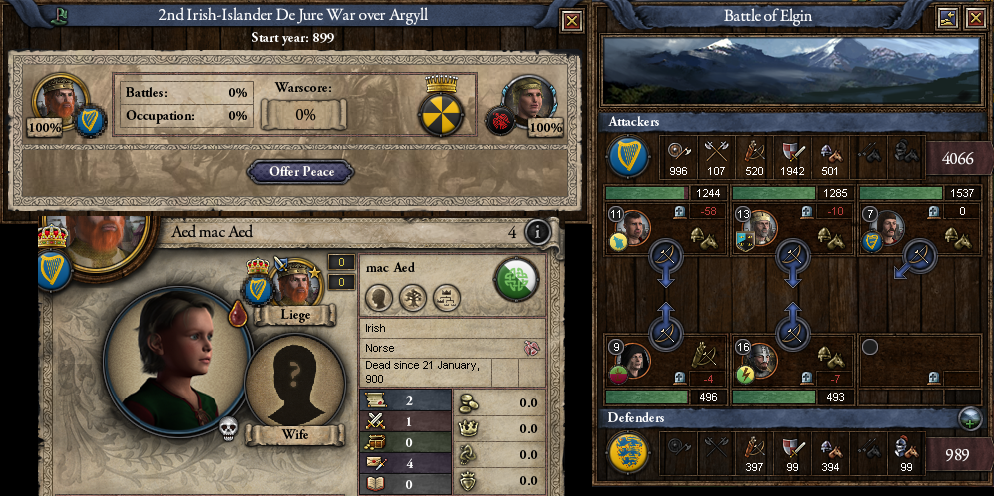 He was weighed in the balance and found... wanting.
He was weighed in the balance and found... wanting.An interesting moment of the campaign sticks out; just as Aed was preparing to land a force of five thousand on the coast of Lincoln to wipe out the two thousand Sudreyan warriors camped around the local castle, his scouts informed him of a matching force of Wessexmen intending to cross the border themselves. Not one to ever miss an opportunity, Aed decided to wait rather than rushing in and was rewarded by witnessing two of his rivals grind one another into the dirt.
Another point of interest was the attempted assassination by Jarl Gudfrid of York (Aed's recently subjugated vassal) of his own wife, High Chieftainess Alfhildr. Alfhildr had actually been kept under house arrest in Ath Cliath ever since the war of subjugation, having been captured as a prisoner. In May 900, a vagabond had attempted to sneak into the High Chieftainess' residence and knife her to death, but had been captured by the house guards. Under torture he revealed his employer as being her own husband. Spymistress Taileflaith urged an arrest, and as the Jarl was the most powerful vassal in the Kingdom and most likely to rebel King Aed judged it a wise course of action.
Gudfrid, catching wind of the plan, withdrew from Aed's court and demanded his independence once again as a petty king. The act forced another war, and not one that Aed objected too strongly to fighting - he had defeated Gudfrid once, he would do it again.
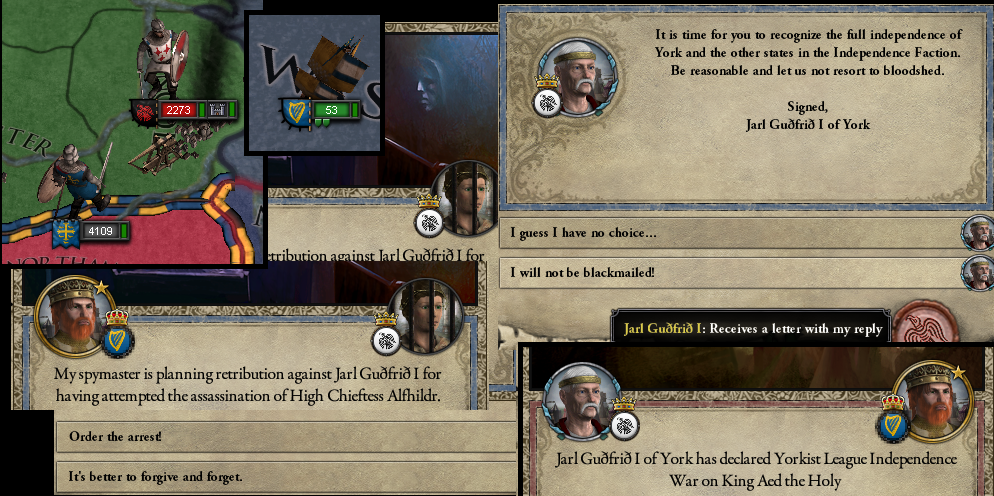 Pictured: Marital strife ballooning rapidly out of control.
Pictured: Marital strife ballooning rapidly out of control.Aed's response to the declaration of war was what he called "The Southward Push"; he split his army in two and pushed southward from Lothian, crushing any Yorkist armies in his path. By the time he reached the midlands Jarl Gudfrid's forces were hopelessly thinned. After a few lightning sieges by Aed's eight thousand man army, Jarl Gudfrid accepted his fate and surrendered.
As punishment and in order to restore the balance of power, Aed began by stripping the county of Lancaster from Gudfrid. He also restored the Jarldoms of Mercia and Northumberland, granting them to loyal vassals within those jarldoms. This did not directly weaken Gudfrid as much as Aed had anticipated; a better action would have been to revoke his Jarldom, shattering his liege contract with his many chiefs. Perhaps Aed wished to save this for another, more easily crushed rebellion, or perhaps he simply was unaware of the technicalities involved. Either way, the new Jarls of Mercia and Northumberland were left with precious few lands to govern save their own.
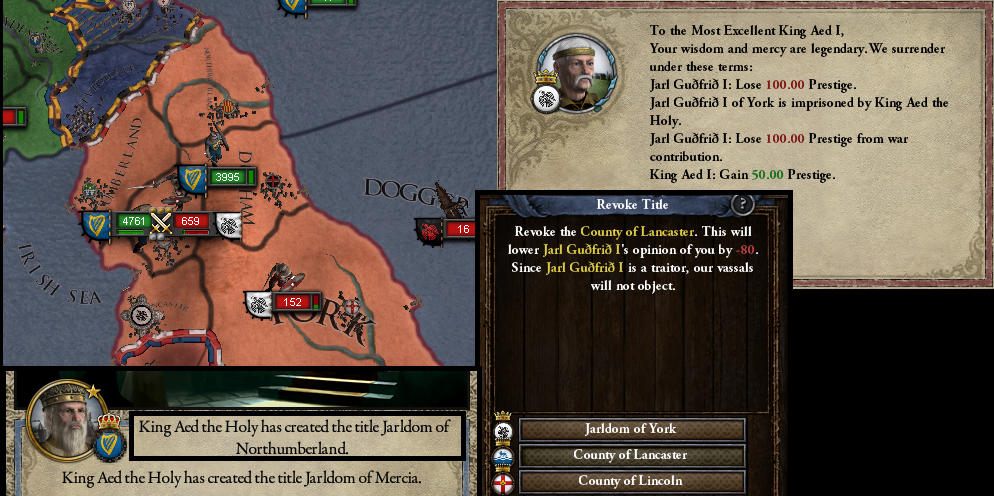 The Southward Push. Pretty much what it says on the tin.
The Southward Push. Pretty much what it says on the tin.901, in addition to seeing Aed turn fifty, saw the death of his bride of thirty-four years, Lairsifiona. A faithful if occasionally frustrating wife, Lairsifiona had stood by Aed's side since the very beginning of his bloody rise to power. Naturally, Aed almost immediately remarried for the assistance of managing his estate - although this time to a chaste Gydja in an attempt to avoid further issues of succession.
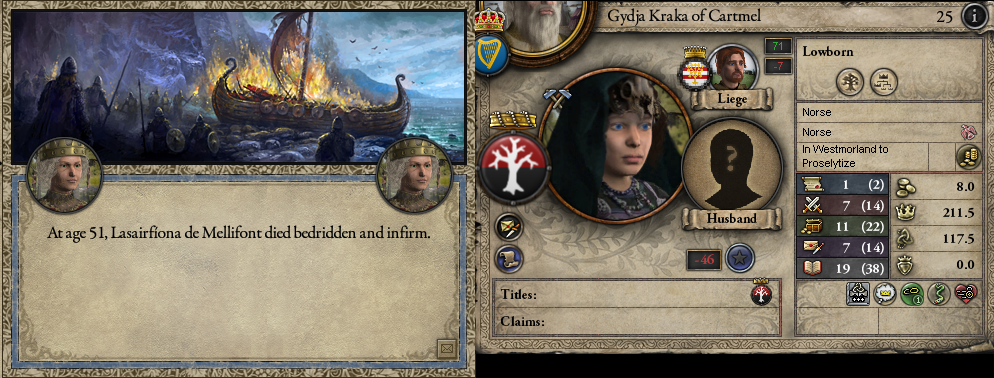 She dies within two years, but during that time advances in Legalism allow Aed to reform the law again and keep his extended demesne without needing to remarry.
She dies within two years, but during that time advances in Legalism allow Aed to reform the law again and keep his extended demesne without needing to remarry.In the winter of 901 Jarl Bertil surrendered the county of Argyll to King Aed. Immediately after accepting his surrender, Aed pledged the full support of his armies to aiding Sudreyar in resisting the holy war being waged upon it by Wessex. Although they might be rivals, the validity of the Norse pantheon was under threat and Aed felt it was a higher goal to pursue.
Aed began a campaign of looting and devastation upon Wessex, a reign of terror so destructive that the temple of Winchcombe in Gloucester was completely and utterly obliterated by fire. It was during this looting that Aed's raiders came upon a strange key made out of the same light, strong metal as that of the chest Aed had discovered decades before, bearing the same tri-knot symbol. The key fit the chest, and Aed opened it with great anticipation only to find that the scrolls within had long since decayed so much as to be unrecognisable. All that could be found within the chest were a few marks of the tri-knot, a handful of words in an unknown language and one recogniseable name in Greek:
Atlantis.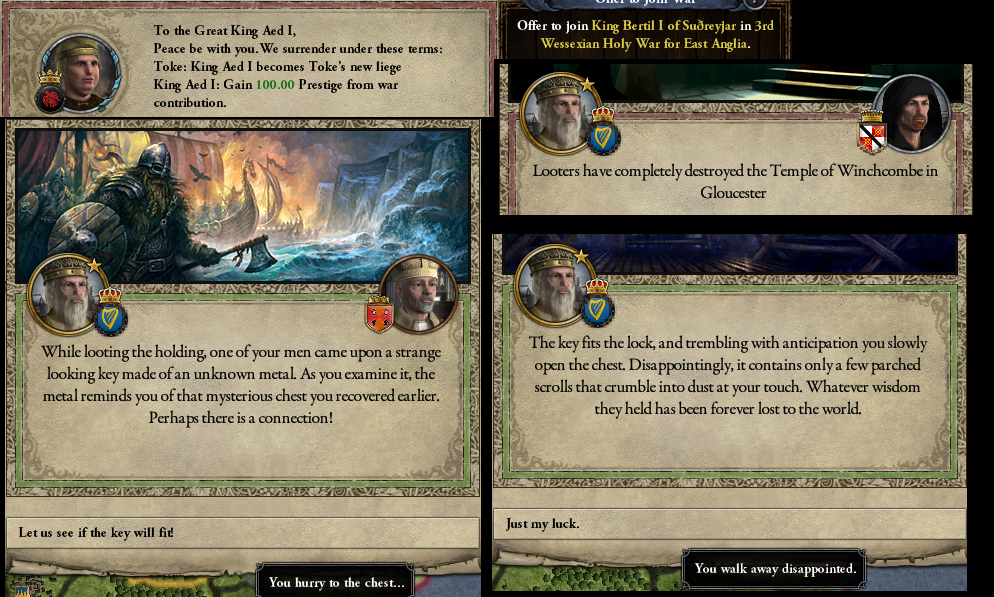

 Author
Topic: Let's Play CK2: The Vikings of Ireland (Read 21300 times)
Author
Topic: Let's Play CK2: The Vikings of Ireland (Read 21300 times)
